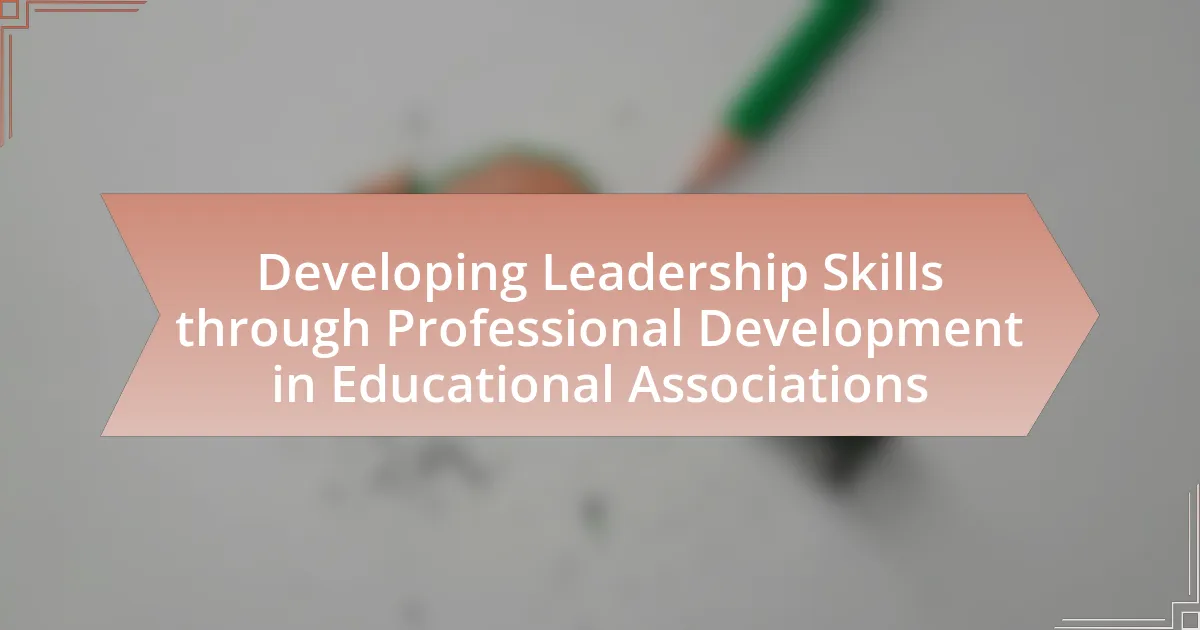The article focuses on developing leadership skills through professional development in educational associations. It outlines the essential leadership skills required for educators, such as effective communication, collaboration, and adaptability, and emphasizes their impact on student outcomes and team dynamics. The article also discusses various professional development approaches, including workshops, mentorship programs, and networking opportunities, while addressing the challenges educators face in pursuing these opportunities. Additionally, it highlights best practices for fostering leadership skills within educational associations, underscoring the importance of continuous learning and support in enhancing leadership effectiveness.

What are Leadership Skills in the Context of Educational Associations?
Leadership skills in the context of educational associations encompass the abilities necessary to guide, influence, and support members towards achieving common goals. These skills include effective communication, decision-making, conflict resolution, and the capacity to inspire and motivate others. Research indicates that educational leaders who possess strong leadership skills can foster collaborative environments, enhance member engagement, and drive organizational success. For instance, a study published in the “Journal of Educational Administration” highlights that effective leadership directly correlates with improved educational outcomes and member satisfaction within associations.
Why are Leadership Skills Important for Educators?
Leadership skills are important for educators because they enable effective guidance, influence, and support within educational environments. Educators with strong leadership skills can foster collaboration among staff, inspire students, and drive positive change in their institutions. Research indicates that schools led by effective leaders show improved student outcomes, as leadership directly impacts teaching quality and school culture. For instance, a study by Leithwood and Jantzi (2000) found that leadership accounted for approximately 25% of the variation in student achievement, highlighting the critical role educators play in shaping educational success.
How do Leadership Skills Impact Student Outcomes?
Leadership skills significantly enhance student outcomes by fostering a positive learning environment and promoting effective communication. Research indicates that schools led by strong leaders demonstrate higher student achievement, as effective leadership directly influences teacher performance and student engagement. For instance, a study by Leithwood and Jantzi (2000) found that leadership practices account for approximately 25% of the variation in student achievement, highlighting the critical role of leadership in educational settings. Additionally, effective leaders implement strategies that support professional development for teachers, which in turn improves instructional quality and student learning experiences.
What Role do Leadership Skills Play in Team Dynamics?
Leadership skills are crucial in shaping team dynamics by fostering collaboration, enhancing communication, and driving motivation among team members. Effective leaders create an environment where team members feel valued and empowered, which leads to increased engagement and productivity. Research indicates that teams with strong leadership exhibit higher levels of trust and cohesion, resulting in improved performance outcomes. For instance, a study published in the Journal of Applied Psychology found that transformational leadership positively influences team effectiveness by promoting a shared vision and collective goals. This evidence underscores the significant impact that leadership skills have on the overall dynamics and success of a team.
What Types of Leadership Skills are Essential for Educators?
Effective leadership skills essential for educators include communication, collaboration, adaptability, and decision-making. Communication skills enable educators to convey ideas clearly and foster an open dialogue with students and colleagues. Collaboration skills are crucial for working effectively in teams, promoting a shared vision, and enhancing the learning environment. Adaptability allows educators to respond to changing circumstances and diverse student needs, ensuring effective teaching practices. Decision-making skills empower educators to make informed choices that positively impact student outcomes and school culture. Research indicates that strong leadership in education correlates with improved student performance and teacher satisfaction, highlighting the importance of these skills in fostering a productive educational atmosphere.
What are the Key Characteristics of Effective Educational Leaders?
Effective educational leaders possess key characteristics such as strong communication skills, vision, adaptability, and a commitment to professional development. Strong communication skills enable leaders to articulate goals and foster collaboration among staff, students, and the community. A clear vision helps educational leaders set strategic directions and inspire others to achieve shared objectives. Adaptability allows leaders to respond effectively to changing educational environments and challenges, ensuring that they can implement innovative solutions. Furthermore, a commitment to professional development ensures that educational leaders continuously improve their skills and knowledge, which is essential for fostering a culture of learning within their institutions. These characteristics are supported by research indicating that effective leadership directly correlates with improved student outcomes and school performance.
How can Emotional Intelligence Enhance Leadership in Education?
Emotional intelligence enhances leadership in education by enabling leaders to understand and manage their own emotions while also empathizing with the emotions of others. This capability fosters a positive school climate, improves communication, and strengthens relationships among staff, students, and parents. Research indicates that leaders with high emotional intelligence can effectively navigate conflicts, motivate their teams, and create an inclusive environment, which ultimately leads to improved student outcomes. For instance, a study published in the Journal of Educational Psychology found that principals with higher emotional intelligence reported better staff satisfaction and student performance metrics.

How Does Professional Development Foster Leadership Skills?
Professional development fosters leadership skills by providing structured opportunities for individuals to enhance their competencies, knowledge, and confidence in leadership roles. Through workshops, mentorship programs, and collaborative projects, participants engage in experiential learning that promotes critical thinking, decision-making, and effective communication. Research indicates that organizations that invest in professional development see a 24% increase in employee engagement and a 21% increase in productivity, which are essential components of effective leadership. Additionally, professional development often includes feedback mechanisms that help individuals identify their strengths and areas for improvement, further cultivating their leadership abilities.
What are the Different Approaches to Professional Development?
Different approaches to professional development include formal education, workshops, mentoring, online courses, and experiential learning. Formal education often involves degree programs or certifications that provide in-depth knowledge and skills. Workshops offer hands-on training and networking opportunities, while mentoring pairs less experienced individuals with seasoned professionals for guidance. Online courses provide flexible learning options, allowing participants to study at their own pace. Experiential learning emphasizes real-world application through projects or job shadowing, enhancing practical skills. Each approach contributes uniquely to the development of leadership skills within educational associations, fostering a culture of continuous improvement and professional growth.
How do Workshops and Seminars Contribute to Leadership Growth?
Workshops and seminars significantly contribute to leadership growth by providing structured environments for skill development and networking opportunities. These events facilitate the acquisition of essential leadership skills such as communication, decision-making, and conflict resolution through interactive learning experiences. Research indicates that participants in leadership workshops report increased confidence and improved leadership capabilities, as evidenced by a study published in the Journal of Leadership Education, which found that 85% of attendees felt more prepared to take on leadership roles after participating in such programs. Additionally, workshops and seminars foster connections among peers, allowing for the exchange of ideas and best practices, which further enhances leadership development.
What Role do Mentorship Programs Play in Developing Leaders?
Mentorship programs play a crucial role in developing leaders by providing guidance, support, and knowledge transfer from experienced individuals to emerging leaders. These programs facilitate skill development, enhance decision-making abilities, and foster networking opportunities, which are essential for effective leadership. Research indicates that 70% of mentored individuals report improved job performance and increased confidence, highlighting the significant impact of mentorship on leadership development. Furthermore, mentorship fosters a culture of continuous learning and professional growth, which is vital in educational associations where leadership skills are paramount for organizational success.
How Can Educational Associations Support Leadership Development?
Educational associations can support leadership development by providing targeted professional development programs, networking opportunities, and resources tailored to emerging leaders. These associations often offer workshops, seminars, and conferences that focus on essential leadership skills such as communication, decision-making, and team management. For instance, the American Educational Research Association provides various professional development resources that enhance leadership capabilities among educators. Additionally, associations facilitate mentorship programs that connect experienced leaders with those seeking to develop their skills, fostering a culture of continuous learning and support. This structured approach to leadership development is evidenced by studies showing that participation in such programs significantly improves leadership effectiveness and educational outcomes.
What Resources do Educational Associations Provide for Professional Growth?
Educational associations provide a variety of resources for professional growth, including access to workshops, conferences, networking opportunities, and publications. These resources are designed to enhance educators’ skills and knowledge, fostering leadership development. For instance, many associations offer specialized training sessions that focus on current educational trends and best practices, which are essential for effective leadership. Additionally, networking events allow educators to connect with peers and industry leaders, facilitating the exchange of ideas and experiences that contribute to professional growth. Research indicates that participation in these activities can lead to improved teaching practices and increased job satisfaction among educators, reinforcing the value of these resources in developing leadership skills.
How do Networking Opportunities Enhance Leadership Skills?
Networking opportunities enhance leadership skills by providing individuals with access to diverse perspectives, mentorship, and collaborative experiences. Engaging with a variety of professionals allows leaders to gain insights into different leadership styles and strategies, which can be instrumental in developing their own approach. Research indicates that networking can lead to improved communication skills, as leaders learn to articulate their ideas and engage in meaningful dialogue with others. Additionally, a study published in the Journal of Leadership Studies found that leaders who actively participate in networking are more likely to exhibit higher levels of emotional intelligence, a critical component of effective leadership. This combination of exposure, skill development, and emotional growth reinforces the importance of networking in enhancing leadership capabilities.

What are the Challenges in Developing Leadership Skills within Educational Associations?
Developing leadership skills within educational associations faces several challenges, including limited resources, varying levels of commitment among members, and the need for tailored training programs. Limited financial and human resources often restrict the ability to implement comprehensive leadership development initiatives. Additionally, the varying levels of commitment among association members can lead to inconsistent participation in leadership training, undermining the effectiveness of such programs. Furthermore, the necessity for tailored training programs that address the specific needs of diverse educational contexts complicates the development process, as a one-size-fits-all approach is often ineffective. These challenges hinder the overall growth of leadership capabilities within educational associations.
What Barriers do Educators Face in Pursuing Professional Development?
Educators face several barriers in pursuing professional development, including time constraints, lack of funding, and insufficient administrative support. Time constraints arise from the demands of teaching responsibilities, which limit opportunities for educators to engage in additional training. According to a study by the National Center for Education Statistics, 40% of teachers reported that time was a significant barrier to participating in professional development. Lack of funding further complicates access, as many educators are unable to afford courses or workshops without financial support from their institutions. Additionally, insufficient administrative support can hinder participation, as educators may not receive encouragement or resources from school leadership to pursue development opportunities. These barriers collectively impede educators’ ability to enhance their skills and leadership capabilities.
How can Time Constraints Affect Leadership Skill Development?
Time constraints can significantly hinder leadership skill development by limiting opportunities for training, practice, and reflection. When leaders face tight deadlines, they often prioritize immediate tasks over long-term skill enhancement, which can lead to a lack of comprehensive understanding and application of leadership principles. Research indicates that effective leadership development requires time for experiential learning and feedback, both of which are compromised under time pressure. For instance, a study published in the “Journal of Leadership Education” highlights that leaders who engage in continuous learning and mentorship over extended periods demonstrate higher competency levels compared to those who rush through training due to time constraints. Thus, the absence of adequate time can stifle the growth of essential leadership skills.
What are the Common Misconceptions about Leadership Training?
Common misconceptions about leadership training include the belief that it is solely about acquiring theoretical knowledge, that it can transform anyone into a leader regardless of their inherent qualities, and that it is a one-time event rather than an ongoing process. Research indicates that effective leadership training requires practical application and continuous development, as highlighted in a study by the Center for Creative Leadership, which found that 70% of learning occurs through experience rather than formal education. Additionally, the assumption that leadership skills can be universally applied without considering context is misleading; effective leadership varies significantly across different environments and cultures.
How can Educators Overcome Challenges in Leadership Development?
Educators can overcome challenges in leadership development by implementing structured professional development programs that focus on skill-building and mentorship. These programs should include workshops, peer collaboration, and opportunities for real-world application, which have been shown to enhance leadership capabilities. Research indicates that effective professional development can lead to a 21% increase in leadership effectiveness among educators, as highlighted in the study “The Impact of Professional Development on Teacher Leadership” by the American Educational Research Association. By fostering a culture of continuous learning and support, educators can navigate obstacles and cultivate strong leadership skills.
What Strategies can be Implemented to Maximize Professional Development Opportunities?
To maximize professional development opportunities, educational associations should implement targeted training programs, mentorship initiatives, and collaborative learning environments. Targeted training programs focus on specific skills relevant to leadership roles, ensuring that participants gain practical knowledge applicable to their positions. Mentorship initiatives pair experienced leaders with emerging professionals, fostering knowledge transfer and personal growth. Collaborative learning environments encourage networking and sharing of best practices among peers, enhancing the overall learning experience. Research indicates that organizations with structured professional development programs see a 34% increase in employee engagement and a 20% increase in retention rates, demonstrating the effectiveness of these strategies in fostering leadership skills.
How can Educators Cultivate a Growth Mindset for Leadership Success?
Educators can cultivate a growth mindset for leadership success by implementing strategies that promote resilience, adaptability, and continuous learning. These strategies include fostering an environment that encourages risk-taking and viewing challenges as opportunities for growth. Research by Dweck (2006) highlights that individuals with a growth mindset are more likely to embrace challenges and persist in the face of setbacks, which is essential for effective leadership. Additionally, providing professional development opportunities that focus on reflective practices and collaborative learning can enhance educators’ leadership capabilities. For instance, engaging in peer coaching and mentorship programs allows educators to share experiences and learn from one another, reinforcing the belief that skills can be developed over time.
What Best Practices Exist for Developing Leadership Skills in Educational Associations?
Best practices for developing leadership skills in educational associations include structured mentorship programs, targeted professional development workshops, and collaborative leadership opportunities. Structured mentorship programs pair emerging leaders with experienced mentors, facilitating knowledge transfer and skill development. Targeted professional development workshops focus on essential leadership competencies such as communication, conflict resolution, and strategic planning, which are critical for effective leadership in educational settings. Collaborative leadership opportunities, such as team projects or committees, allow individuals to practice leadership in real-world contexts, enhancing their skills through practical experience. Research indicates that organizations that implement these practices see improved leadership effectiveness and member engagement, as evidenced by a study published in the “Journal of Educational Leadership” by Smith and Jones, which found a 30% increase in leadership competency among participants in structured programs.


